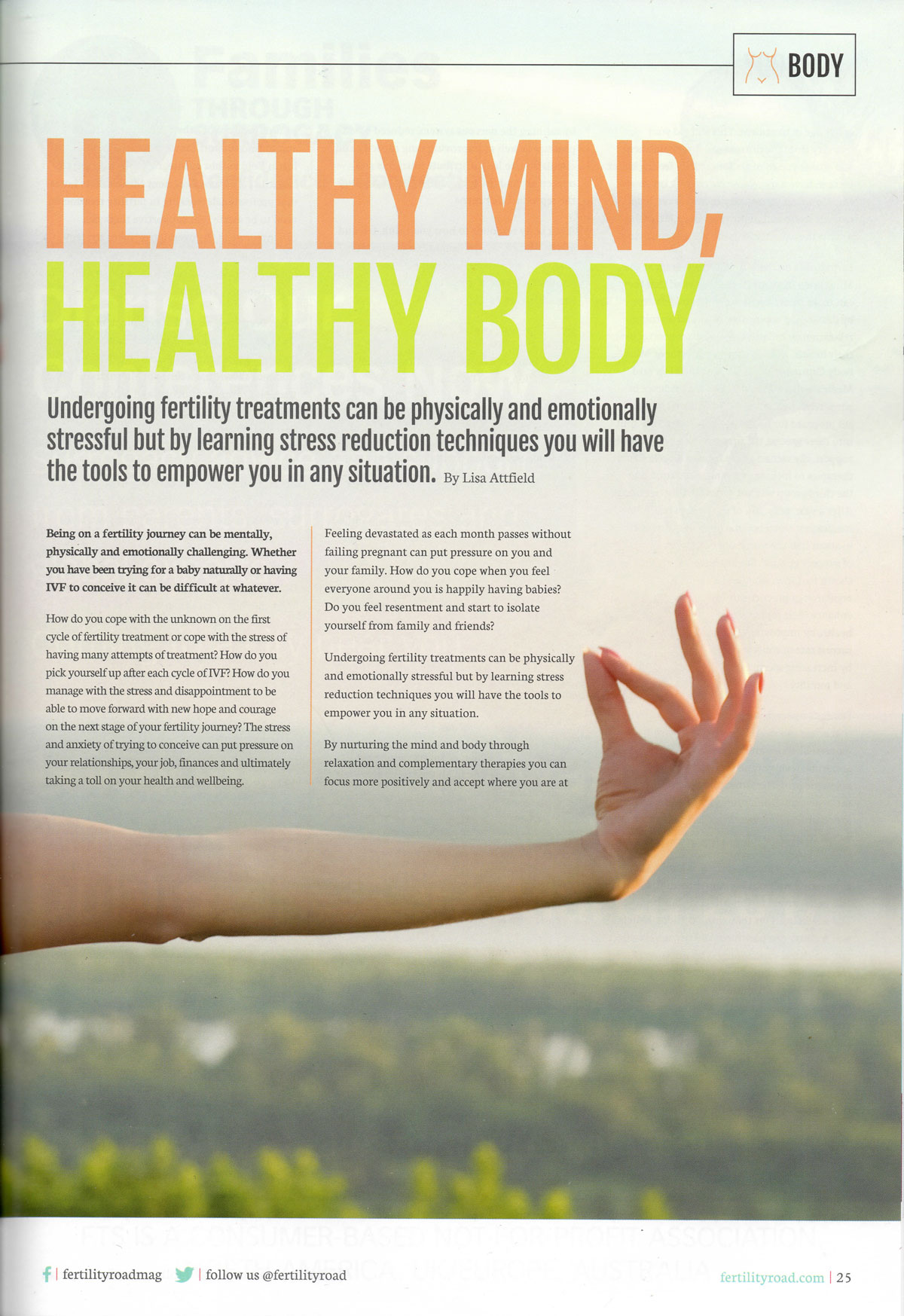

Being on a fertility journey can be mentally, physically and emotionally challenging. Whether you have been trying for a baby naturally for a while, or having assisted reproductive treatment or IVF to conceive – it can be difficult at whatever stage you are at on your journey. How do you cope with the unknown on the first cycle of fertility treatment, or cope with the stress of having many attempts of treatment? How do you pick yourself up after each cycle of IVF? How do you manage with the stress and disappointment to be able to move forward with new hope and courage on the next stage of your fertility journey? The stress and anxiety of trying to conceive can put pressure on your relationships, your job, and finances, and ultimately taking a toll on your health and wellbeing.
Feeling devastated and a failure, as each month passes without falling pregnant can put pressure on you and your family. How do you cope when you feel everyone around is happily having babies. Do you feel resentment and start to isolate your shelf from family and friends. Infertility can cause emotional issues, how can you learn to manage your feelings and thoughts on your fertility journey?
By learning stress reduction techniques you can not only learn tools to help you mange stress in everyday life, but also to empower you in situations when your fertility is in the hands of the fertility clinics and doctors managing your fertility treatment.
By nurturing the mind and body through relaxations and complementary therapies you can focus more positively, stay calm and accept where you are at each stage of treatment. This will aid your recovery of distress and disappointment to enable you to move forward to the next stage, with hope to thrive mentally and physically. By feeling better your can have a more positive outlook and look at different perspectives on a situation, as you many have to live and cope with your fertility journey for months or even years. This is when complementary therapies to manage stress and improve mental clarity and can benefit the patient alongside western medicine, to heal and focus on the wellbeing of the patient on their journey to having a healthy pregnancy and baby.
Participants on the Mind Body Program at the Mind Body Institute in the US, state that they can make better decision and manage stress, by developing coping strategies by learning relaxation techniques to gain better control over their health. Alice Domar the director of Mind/Body Centre for Women’s Health at Harvard Medical School demonstrated the evidence of stress relief is a study of 110 women trying to get pregnant for up to two years. They were split into three groups, the first receiving only fertility support, the second group focused on relaxation therapies to include yoga and meditation and the third group was just given fertility treatment. “After a year, only 20% of the women on medication alone became pregnant compared to about half the women in both types of support groups” For men to benefit to, studies show that men who have a regular yoga practice can enhance their reproductive health, by improving the success rate of conception by increasing sperm count and motility.
Domar’s research suggests that stress can delay menstrual cycles and create abnormal levels of pituitary hormone prolactin, which is responsible for ovulation. Domar found that infertile women are significantly more depressed than their fertile counterparts.
Today it is accepted that there is mind-body connection, such as our emotions, mental, social and behavioural factors affect our health and wellbeing. Our thoughts, attitudes, beliefs and feelings can positively and negatively affect our biological functioning. The mind-body connection can be defined as the information flow of biology regulators, a network of interconnections by the nervous system that regulates organ functions and hormones. The brain and the immune system continuously signal each other, often along the same pathways, which can explains why our state of mind can influences our health. In acupuncture and Chinese medicine there are pathways called meridians in the body along which vital energy to flow. In yoga philosophy there are energy centres within the human body known as chakras, which help to regulate the body processes, from organ function to the immune system. Yoga breathing and yoga postures – asana yoga benefit the body by calming the nervous system, reduced blood pressure as well as improving lung capacity and circulation, to help distribute nutrients and oxygen around the body and organs including the reproductive organs.
‘Your body responds to how you think, fell and act, this is one type of mind/body connection when you are stressed, anxious, or upset , your body reacts in a way that might tell you something isn’t right’
So how can you improve your emotional health?
• Calm mind and body – relaxation techniques, meditation, yoga, Tai Chi
• Lifestyle – nutrition and diet, work life balance, getting enough sleep
• Develop resilience – Coping strategies to manage stress, CBT -cognitive behavioural therapy
• Expressing your feelings – able to release emotions and let go, support from counsellors.
Clinical research indicates 55% women attending a mind body program conceive (Alice Domar, PH.D & Herbert Benson, MD 2005) Dr Benson work integrates modern scientific medicine, physiology, nutrition, exercise physiology and belief to enhance the natural healing capacities of body and mind According to the NHS, “mindfulness helps mental wellbeing by becoming more aware of the present moment can help us enjoy the world around us more and understand ourselves better.
Evidence suggests there are five steps we can all take to improve our mental wellbeing.”
Five steps to mental wellbeing:
• Connect – connect with the people around you
• Be active – some people find that it is easier to cope with an over-busy mind if they are doing gentle yoga and walking
• Keep learning – learning new skills to give you a sense of achievement and confidence.
• Give to others – even the smallest act can count
• Be mindful – be more aware of the present moment, including your thoughts and feelings, your body and the world around you.
The NHS recognised that many patients find the experience of fertility treatment as one of the most stressful experiences of their lives. So it is important for patients to be encouraged to communicate about their fertility treatment to find support for their specific needs. Justin Bold writes in her handbook “Integrated approaches it infertility, IVF and recurrent miscarriages”. That professionals working in fertility treatments need to beware that supportive therapies can integrate in the overall treatment strategy and to be mindful of the importance of stress management itself, at each stage particularly at the two –week wait stage. If the results are negative, how do you manage your recovery emotionally and physically, to then decide on the next course of action on you journey?
It has been recognised that complementary therapies play an important role in fertility patient’s health and wellbeing. Scientific evidence shows that a range of alternative therapies from acupuncture and reflexology, nutrition and yoga can help boost fertility. Fertility expert Zita West, states “although complementary therapies are not necessarily a cure for infertility, they can help encourage conception by bringing the body back into balance. With people working harder and becoming more stressed, these days it can take longer to get pregnant,’ she says. ‘Helping the body to cope with the demands of modern life such as by employing acupuncture or sound nutritional advice can do wonders to stimulate the reproductive organs into action.’
Yoga and meditation can help with infertility, by practicing relaxation techniques you can increase your clarity and focus of the mind and body connection, this can improve your wellbeing. Physical and mental therapy is important accomplishments of a yogic practitioner, as it works holistically to bring balance and harmony with union between the mind and body. Fertility Yoga is a tailored yoga practice to help with infertility issues and mange stress and anxiety through breathing and relaxation techniques, specify yoga postures are also used in Fertility Yoga sessions to enhance fertility.
Fertility Yoga will:
• Increase blood flow and energy to the pelvic area
• Stimulate the reproductive system
• Reduce stress
• Calm the mind of negative thoughts
• Balance hormones
• Enhance mind and body connections
Embrace the connection between the mind and body, to reduce your stress and optimise your fertility treatment. Whatever stage you are at on your challenging path to parenthood, feel empowered and positive on your journey and that you have made the right choices for you and your partner on your journey!
